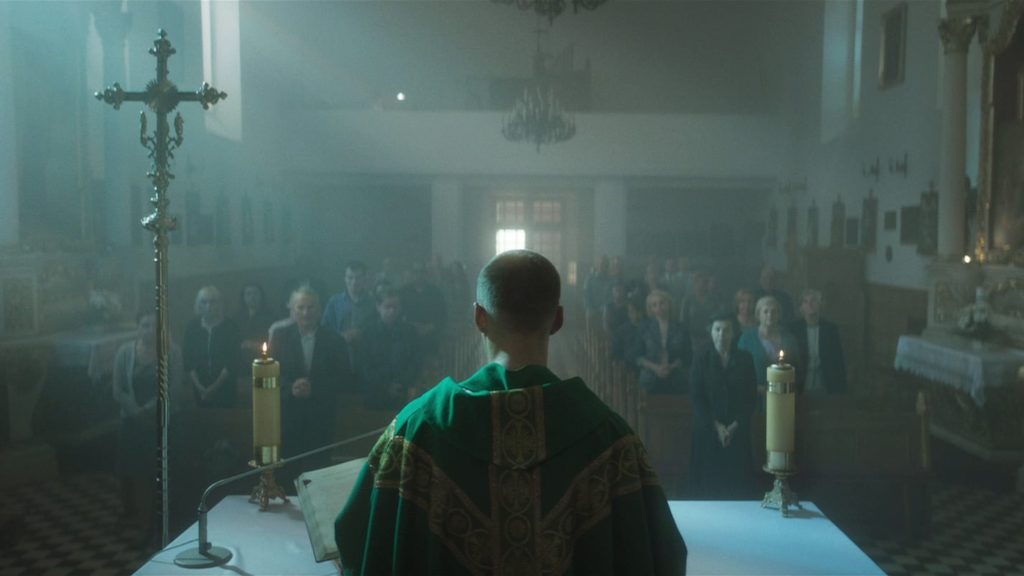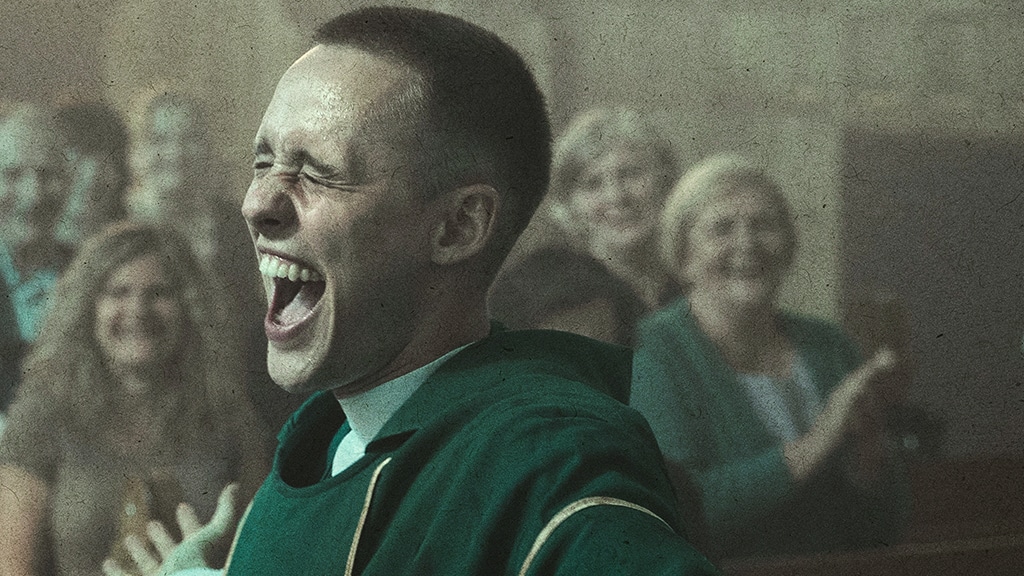A gut-punch of a character drama with a plot that is vastly overshadowed by its own protagonist, Corpus Christi is a powerful yet mixed experience. The movie was the Polish selection for the 92nd Academy Awards, receiving a nomination in the Best Foriegn Film category. Unfortunately, many of this year’s nominees have been overshadowed by the juggernaut that is Parasite. Yet, here we have a very thoughtful and engaging film, deserving of attention in its own right.
Daniel (Bartosz Bielenia), a young man on the tail end of his juvie sentence, has found a sense of purpose in religion. On his last day, the charismatic priest he has been serving under, Father Tomasz (Łukasz Simlat), provides the unfortunate reality check that no seminary would take him due to his criminal past. Upon leaving, he immediately goes back to his pre-penitenterary past of drugs, drinking, and sex, before leaving by bus to reach the sawmill job the prison lined up for him. He reaches the mill and promptly leaves in favor of the small town next door, visiting their church straight away. When the woman sitting inside, Marta (Eliza Rycembel), pegs him for a miscreant from the sawmill, he tells her that he is a priest and shows her the shirt and collar he had fashioned the night before at a party. Unexpectedly, she believes him and brings her mother, Lidia (Aleksandra Konieczna), who in turn takes him to meet her Priest husband (Zdzislaw Wardejn). Daniel introduces himself as Father Tomasz rather than using his own name. After the Vicor’s health takes a turn, Daniel finds himself entrusted with the parish’s care and, much to his dismay, becomes the town’s interim priest. As he begins to truly embarrass his new position, a tragic car accident in the town’s recent past comes to the forefront of his focus, all while trying to keep the truth of his clerically centered con under wraps.
The premise here is the sort of thing we have seen before — a criminal must impersonate a member of society in order to escape their past and move forward. It’s Orson Welles’ The Stranger from the perspective of the antagonist, with select imagery that brings to mind Robert Mitchum’s malevolent preacher from Night of the Hunter. However, that isn’t to say this is a bad thing. What the movie does with this premise makes it stand out over similar takes on the concept.
For one, Daniel has a genuine interest in fulfilling his duties and living up to the standards of the profession he has chosen to impersonate. This caught me off guard. There were no plotlines where he uses his position to run some sort of scheme or bring his criminal activity into the parish. In fact, the opposite is true. He really does strive to live the life of a priest as best he knows how. Over the course of the movie, he becomes further and further invested in the town’s well being and those who have been left behind by the Vicor. He wants to make a difference in these people’s lives.

The movie’s take on the catholic church as a whole was interesting. It wasn’t out and out critical. In fact, it showed the positive and lasting impact that the organization can make in people’s lives, while also addressing the corruption inherently possible when a person is given this much power.
This story, and by extension film, lives or dies with Daniel. If he works, the movie does. If he doesn’t work, well, the opposite is true. So, it is to this film’s benefit that he is a character that can hold attention for the 2 hour runtime. He is motivated and complex, endlessly watchable and impossibly contradictory. He strives to be the spiritual center of this backwater town in earnest, but he also fails, repeatedly. The movie doesn’t overly dramatize his screw ups. He takes his growth and his regression in stride.
It sort of begs the question, “What is Daniel?” What is he meant to be? A farce? A hero? A mixture of the two? In many ways, he is Catholicism incarnate. The highs and lows of a very old, flawed organization wrapped up into a single breathing organism. If anyone can be called by God, then why not Daniel? If failure is parting of growing/becoming closer to God, then his missteps don’t feel quite as jarring. If recent history has taught us anything, who among us is more flawed than a priest? If in reality the bar is virtually on the floor, then a convict who occasionally gives in to drugs and sex doesn’t seem so bad, especially when he is trying to do the right thing.
The film is trying to cut through the theatrics and get to the heart of the matter. Rather than try to stop him, what would happen if Daniel were embraced and given guidance? He could be afforded an opportunity at a different strata of society, a chance to rise above his current state of existence. This isn’t a financial issue inherently. He would find respect and care. There would be a town full of people who cherish his presence. He would find an emotional connection in a world he has, unto this point, only found bleakness and pain. Daniel is a wonderfully depthful character, played beautifully by Bielenia
Unfortunately, the same level of praise cannot be given to other characters in the film, nor can it be applied to many aspects of the plot. Not that they are awful by any stretch, but they pale in comparison to our protagonist. They are necessities of his story. Pieces in the filmmaker’s overall plan. Marta, Daniel’s love interest, serves to be just that mainly. Yes, she has issues and problems. Her mother, Lidia, has been arguing with her for years it seems and her brother was one of the accident victims. But, we aren’t shown anything outside Daniel’s view, so we never get to see what she is going through fully. She is a Manically Depressed Pixie Dream Girl. Lidia is also prominently resistant to Daniel’s new ideas and meddling. Dealing with the grief of her dead son is her predominant character trait. Similarly, the entire story involving the tragic car crash that has torn the town apart feels “necessary.” Characters and plot cannot be this flippant. If they only exist to keep the movie going and nothing else, they will feel flat. Necessary isn’t interesting. It is a catalyst for plot to happen. The ending resolution to this is somewhat satisfactory, but it ultimately feels underdeveloped. This extends to other parts of the film as well. The Mayor, the crowd of grieving parents, they are all underdeveloped. Even Daniel becoming a priest was overtly cutesy. The movie has to have a lot of things happen just the right way to set up its premise.

I realise this comes across harsh, and that is not to say that there are not good aspects to any of these elements. The screaming therapy scene and letter reading scene come to mind as examples of well done drama. However, often the individual parts feel more like melodrama. The sort of situations that come about in season two of a TV show covering the same material. The integration of Daniel’s prison life into his new priestly life is a notable exception. It had depth. It had something to say. It had somewhere to go. It was a lovely bit of both plot and pathos. I wish other plot points in the film had the same depth and stakes. Although the film’s final scene sort of lacks a punch beyond its visually visceral nature. There are too many threads left hanging in order to come to a conclusion on the film’s climactic point, beyond any obvious reads.
Ultimately, the film rises above some hokey plot issues and the hoops it has to jump through to set up its premise out the gate. Yes, some of the plot itself feels overly dramatic and there are events that feel as though they were a last ditch effort on the writer’s part to have “things happen” after Daniel becomes a priest. But, once it gets going, Daniel carries the movie. What is most interesting is how he deals with the issues the movie presents to him. How do they excite him? Scare him? Change him? The picture the movie paints of Catholicism in Poland and how this particular character fits into that world are the things that have stuck with me after the credits have long since rolled.
Bartosz Bielenia’s performance as Daniel is wonderful, and I’m anxiously looking forward to what he does next. That can be said of the film’s director, Jan Komasa, as well. While I do have my issues, this is an intensely nuanced character piece, and a very enjoyable, engaging, and at times, heartbreaking watch. I fully recommend you seek this out while it’s still streaming in our currently quarantined times.
Review
Rating
RN Review of Corpus Christi
A gut-punch of a character drama with a plot that is vastly overshadowed by its own protagonist, Corpus Christi is a powerful yet mixed experience.




